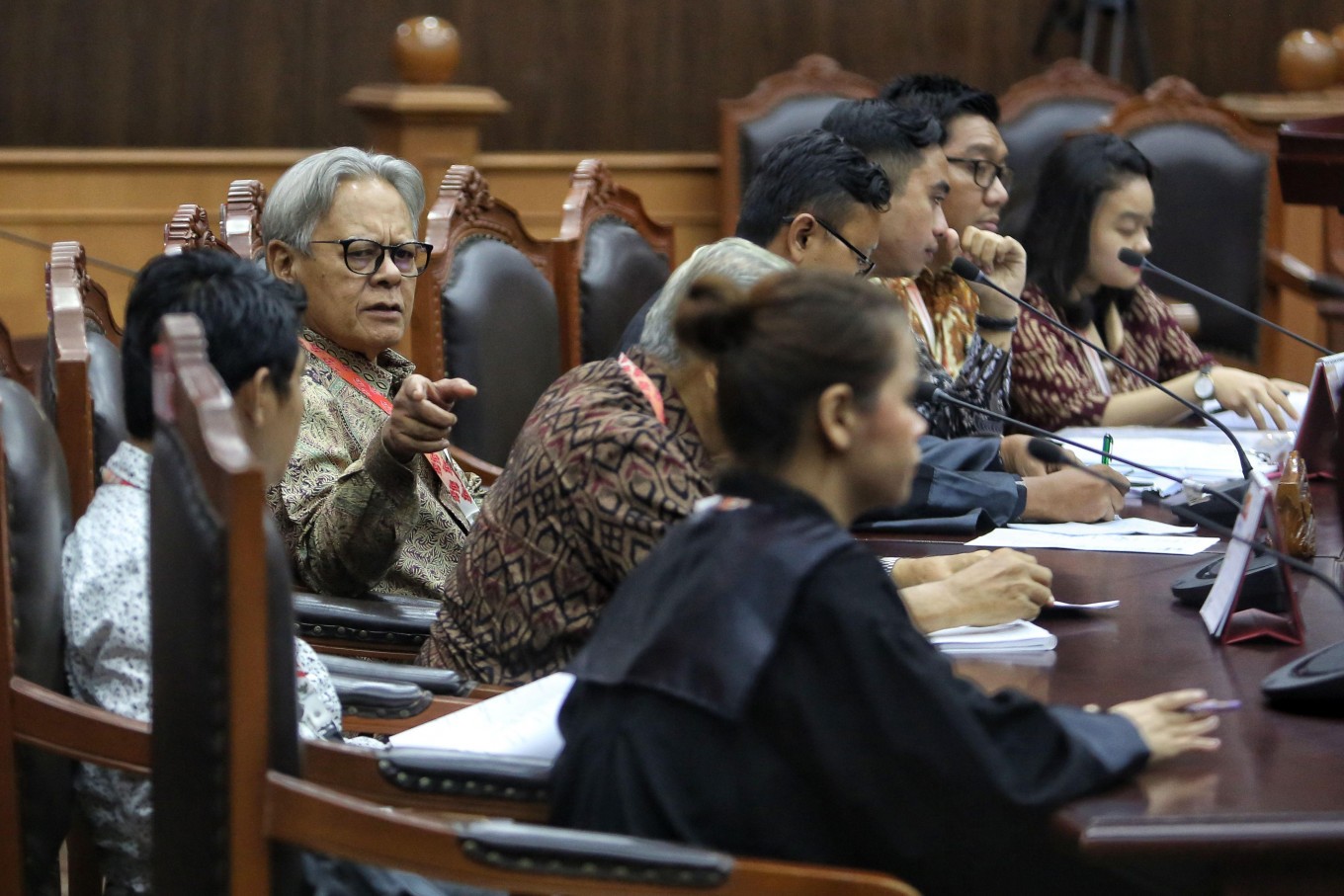Popular Reads
Top Results
Can't find what you're looking for?
View all search resultsPopular Reads
Top Results
Can't find what you're looking for?
View all search resultsAntigraft activists push for repeal of KPK Law
Indonesia’s antigraft movement appears to have lost ground since the KPK Law revision was passed last year amid nationwide protests that failed to make any ground in restoring the KPK’s former might. Now, their only hope may lie within the halls of the Constitutional Court.
Change text size
Gift Premium Articles
to Anyone
A
ntigraft activists are pinning their hopes on the Constitutional Court to revoke the 2019 Corruption Eradication Commission (KPK) Law, after a year of unavailing efforts challenging the contentious law.
They have expressed the hope that the court will eventually repeal the law to restore public faith in the country’s fight against corruption, which they believe has stalled ever since the law took effect on Oct. 17.
Indonesia’s antigraft movement appears to have lost ground since the KPK Law revision was passed last year amid nationwide protests that failed to make any ground in restoring the KPK’s former might.
Adding insult to injury, a number of graft convicts have had their sentences reduced by the courts and one was even acquitted, with government officials justifying the new trend on the basis that antigraft efforts were impeding investment.
“We only hope that the court will issue a ruling stating that the law should be repealed because it was passed by the House of Representatives using improper legislative procedures. Not to mention that it will have a detrimental effect on the country’s efforts against corruption in the future,” Indonesia Corruption Watch (ICW) researcher Kurnia Ramadhana said in a recent webinar.
Kurnia is one of 13 lawyers who are assisting 14 plaintiffs, including three former KPK commissioners, in challenging the law in court. They registered their petition on Nov. 26, 2019 after accusing the House of unconstitutional conduct in the deliberation of the bill and in the process of passing it into law.
They insist that the revision of the 2002 KPK Law was deliberated in a rush, with lawmakers going through the motions from proposing to drafting the bill and passing it into law in the space of two weeks.
Between Sept. 3 and Sept. 17, 2019, House legislators moved to deliberate the revised law even though it did not even make it onto the list of priority legislation (Prolegnas). They also failed to explain to the public the purpose of the amendment and failed to cooperate with the KPK when the legislative process was underway, the activists claim.
As a result, the plaintiffs accuse the House of violating the 2019 Amended Law for the Drafting of Laws and Article 22a of the 1945 Constitution.
They allege there is reason to believe the deliberation process had allowed lawmakers to insert contentious provisions into the law that eroded the KPK’s credibility as a law enforcement agency.
One controversial article was the transformation of the KPK from an ad hoc independent body into a state institution. The law also changed the status of KPK employees from non-government employees to civil servants.
The plaintiffs and their lawyers have argued that such a major shift reduced the KPK’s independence, now that it was subject to state intervention when dealing with cases.
The new law also led to the establishment of the KPK supervisory council, which has the power to approve or reject arrests, searches and wiretapping activities – adding another layer of red tape to graft investigations. Previously, investigators needed only the approval of the five KPK leaders to engage in the aforementioned activities.
Kurnia said the new provisions had led to the antigraft body’s lackluster performance in the first half of this year. According to an ICW report, the KPK had taken action against just 38 graft suspects, a decline from the 61 suspects handled in the same period in the previous year.
Implementation of the new law also undermined public faith in the commission, as has become evident in multiple surveys.
In January, for instance, A survey by Kompas’ Research and Development Department (Litbang Kompas) showed that around 64 percent of 591 respondents perceived the KPK in a positive light. The level of trust declined to 44 percent in a follow-up survey in June.
“This proves that the KPK was able to perform better under the previous law,” Kurnia said. The plaintiffs are waiting for the court to hold its final hearing on the petition, he added.
Constitutional Court spokesman Fajar Laksono said the court had yet to schedule the next hearing. “They [the judges] will schedule the final hearing for the judicial review once they are ready to issue a ruling,” he said.
However, one of the plaintiffs, former commissioner Laode M. Syarif, was confident that the court would issue a ruling in favor of the petition, going by the strong arguments on the unconstitutional conduct made by expert witnesses.
These include top constitutional law experts Bivitri Susanti and Zaenal Arifin Mochtar, as well as former Supreme Court chief justice Bagir Manan.
“We believe that the Constitutional Court judges will uphold their professionalism in dealing with our judicial review. The court is the only place left for us to obtain justice in the country,” Laode said.
While globally, Indonesia is slowly making its way up Transparency International’s Corruption Perceptions Index, the general perception still sways toward the negative. Based on the 2019 index, Indonesia scored 40 on a scale of zero (highly corrupt) to 100 (clean). The index ranks countries based on how corrupt its public sector is perceived to be by experts and business executives.










